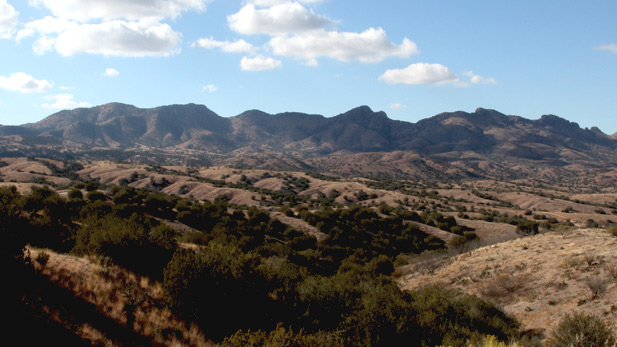 Site of the proposed Rosemont copper mine, looking west from Highway 83.
Site of the proposed Rosemont copper mine, looking west from Highway 83.After the U.S. Forest Service’s approval of the environmental plan for the proposed mine in the Santa Rita Mountains, the issue is likely to end up in litigation.
Environmental groups opposing the mine say it will have a negative impact on air, water and habitat, and plan to challenge the U.S. Forest Service's recent decision to approve a mine plan. Hudbay Minerals Inc., the company that would operate the mine if it gets all necessary federal approvals, would fight a lawsuit, according to Patrick Merrin, a Hudbay vice president.
The latest approval, called a record of decision, was a good sign for Hudbay, said Merrin, who runs the Tucson-based Rosemont project.
“In essence, it shows that we will not violate any American laws, whether they be state, local or federal," he said.
While it is a step in Hudbay's favor, the mine is not on the verge of opening. Hudbay still needs another federal permit before that can happen. And, as has been the case with this project from the start, there’s opposition.
“Throughout the environmental impact statement process they said as long as this mine complies with all applicable laws we’re going to approve it. Well it’s not yet clear that that’s the case,” said Randy Serraglio of the Center for Biological Diversity, which opposes the mine.
Serraglio called the decision "premature" and accused the Forest Service of suppressing public comment and not carefully analyzing the mine's environmental impact.
“The mine’s effects - on our air quality, on our water supply, on our water security, our future for a million people - are so egregious that it requires more analysis," he said.
Merrin contested the claim that public comment was limited or incomplete, citing the project proposal's lifespan, so far, of 11 years. The Forest Service allowed people to look at the mine plan for nine months, and in that time it received 36,000 public comments, Merrin said.
The Forest Service reviewed a handful of Rosemont proposed plans for operation.
“They have selected one … that they believe has the minimal amount of environmental impact," Merrin said.
That’s another point of contention. The proposal will impact the environment, Serraglio said, which is why he sees another motive for federal action.
“There’s not really any reason for that other than politics. And the fact that the Trump administration believes it’s above the law," Serraglio said. “We have no choice but to keep fighting."
He said another federal agency said it was not an adequate environmental protection plan.
"The United States Environmental Protection Agency called it, if not the worst, one of the worst environmental impact statements they’ve ever seen," Serraglio said.
Hudbay would fight a lawsuit in court, Merrin said.
“From our perspective, at this point the permits remain in force while the lawsuits continue, as long as they’re not suspended by a federal judge,” he said. “We’re going to start working on an administrative process with them called the ‘mine plan of operations.’"
That is the document in which Hudbay will take what the Forest Service has approved and apply it to a formal plan, Merrin said. It will allow the federal agency to determine whether the company would meet the environmental protection commitments it has made, he said.
Hudbay and opposition groups now wait to hear if the mine will be granted a permit under the Clean Water Act, which is up to the Army Corps of Engineers.
“They are required to evaluate our impact on traditional navigable waters in the United States," Merrin said. "Our site, we have no wetlands or no flowing water on a regular basis. These are what we call ephemeral washes, meaning they flow due to rain events, so on average they flow between 10 and 15 times a year.”
There’s no timeline for a final decision.



By submitting your comments, you hereby give AZPM the right to post your comments and potentially use them in any other form of media operated by this institution.